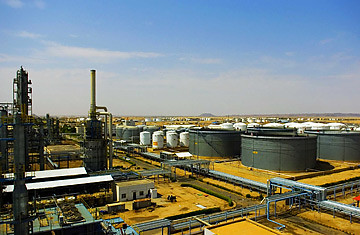
Sudan oil refinery where the newly-emerging oil-rich central African state has been under fire from U.S. imperialism for years. The leadership of the country is being hounded by the ICC which it is not a party to the Rome Statute., a photo by Pan-African News Wire File Photos on Flickr.
South Sudan wants alternative oil pipelines
By Edith M. Lederer
Associated Press / February 20, 2012
UNITED NATIONS—South Sudan's acting U.N. ambassador said Monday his country wants to build alternative pipelines through Kenya, Ethiopia and Djibouti to ship oil while trying to resolve a dispute with neighboring Sudan over fees for using its pipelines.
Landlocked South Sudan, which became independent from Sudan in July, shut down oil production Jan. 28 after accusing Khartoum of imposing extortionate fees and stealing $815 million of its oil revenue. A research note from Commerzbank last month said South Sudan was producing about 350,000 barrels of oil per day.
The countries split without resolving what to do with the coveted oil reserves. About two-thirds of the oil is in South Sudan, but the newly independent nation has been reliant on Sudan's pipelines to export the oil through Port Sudan.
South Sudan envoy David Buom Choat said in an interview with The Associated Press that memorandums of understanding were signed with Kenya in late January for a pipeline that would go to the Indian Ocean port of Lamu and with Ethiopia and Djibouti in February. That pipeline would go from South Sudan's Upper Nile state through Ethiopia to a port in Djibouti, he said.
"It's starting the technical cooperation to build pipelines through those countries," Choat said.
He said South Sudan is continuing negotiations with Sudan on the use of its pipelines but "it's not going too well."
"We are faithfully negotiating with them but they are not really negotiating in good faith," Choat said. "They have put their efforts and mentality on cheating us or getting more than we can get from our own oil."
Sudan has asked for $32 per barrel of oil shipped through its pipelines while South Sudan has offered $1 per barrel, an amount which the country's information minister, Benjamin Barnaba Marial, has said is "the highest in the world."
While South Sudan is losing massive amounts of money by shutting down its oil industry, Sudan is losing money as well -- and it risks losing future revenue if the alternative pipeline routes South Sudan is planning are completed.
Almost all of South Sudan's government revenue -- 98 percent of it -- comes from the oil sector.
Choat said the government is taking "austerity measure" by cutting government expenditures, increasing agricultural production which is a non-oil revenue source, and making sure taxes are collected.
Sudan and South Sudan have a host of other unresolved issues in addition to oil revenue including the demarcation of the north-south border and the status of the disputed Abyei region.
The two countries signed a memorandum of understanding on non-aggression in Ethiopia on Feb. 10, but days later South Sudan accused Sudan of bombing the border town of Jau.
On Friday, Sudan's U.N. Ambassador Daffa-Alla Elhag Ali Osman accused South Sudan of harboring the remnants of rebels from the Darfur conflict in western Sudan. He urged the Security Council "to put pressure on the government of South Sudan not to assist the armed groups who are hosted now in South Sudan."
Choat said South Sudan has told Sudan "that we are not harboring armed groups from Sudan in our territory -- that includes from Darfur or anywhere because we have a policy of non-interference in the affairs of any other sovereign state."
He called on the Security Council to demand that Sudan stop bombing South Sudan territory, including Jau and Bahr el Ghazal, and accused Khartoum of supplying arms and weapons to militia that are against South Sudan.
"Sudan should focus on solving its own problem rather than accusing South Sudan for no reason," Choat said.
No comments:
Post a Comment